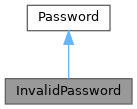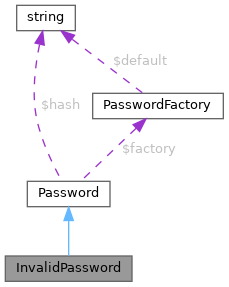Represents an invalid password hash. More...


Public Member Functions | |
| crypt ( $plaintext) | |
| Hash a password and store the result in this object. | |
| equals ( $other) | |
| Compare one Password object to this object. | |
| needsUpdate () | |
| Determine if the hash needs to be updated. | |
| toString () | |
| Convert this hash to a string that can be stored in the database. | |
| verify ( $password) | |
| Checks whether the given password matches the hash stored in this object. | |
 Public Member Functions inherited from Password Public Member Functions inherited from Password | |
| __construct (PasswordFactory $factory, array $config, $hash=null) | |
| Construct the Password object using a string hash. | |
| getType () | |
| Get the type name of the password. | |
Additional Inherited Members | |
 Public Attributes inherited from Password Public Attributes inherited from Password | |
| const | MAX_HASH_SIZE = 255 |
| Hash must fit in user_password, which is a tinyblob. | |
 Protected Member Functions inherited from Password Protected Member Functions inherited from Password | |
| assertIsSafeSize ( $hash) | |
| Assert that hash will fit in a tinyblob field. | |
| isSupported () | |
| Whether current password type is supported on this system. | |
| parseHash ( $hash) | |
| Perform any parsing necessary on the hash to see if the hash is valid and/or to perform logic for seeing if the hash needs updating. | |
 Protected Attributes inherited from Password Protected Attributes inherited from Password | |
| array | $config |
| Array of configuration variables injected from the constructor. | |
| PasswordFactory | $factory |
| Factory that created the object. | |
| string | $hash |
| String representation of the hash without the type. | |
Detailed Description
Represents an invalid password hash.
It is represented as the empty string (i.e., a password hash with no type).
No two invalid passwords are equal. Comparing anything to an invalid password will return false.
- Since
- 1.24
Definition at line 32 of file InvalidPassword.php.
Member Function Documentation
◆ crypt()
| InvalidPassword::crypt | ( | $password | ) |
Hash a password and store the result in this object.
The result of the password hash should be put into the internal state of the hash object.
- Parameters
-
string $password Password to hash
- Exceptions
-
PasswordError If an internal error occurs in hashing
Reimplemented from Password.
Definition at line 33 of file InvalidPassword.php.
◆ equals()
| InvalidPassword::equals | ( | $other | ) |
Compare one Password object to this object.
By default, do a timing-safe string comparison on the result of Password::toString() for each object. This can be overridden to do custom comparison, but it is not recommended unless necessary.
- Deprecated
- since 1.33, use verify()
- Parameters
-
Password | string $other The other password
- Returns
- bool True if equal, false otherwise
Reimplemented from Password.
Definition at line 40 of file InvalidPassword.php.
◆ needsUpdate()
| InvalidPassword::needsUpdate | ( | ) |
Determine if the hash needs to be updated.
- Returns
- bool True if needs update, false otherwise
Reimplemented from Password.
Definition at line 48 of file InvalidPassword.php.
◆ toString()
| InvalidPassword::toString | ( | ) |
Convert this hash to a string that can be stored in the database.
The resulting string should be considered the seralized representation of this hash, i.e., if the return value were recycled back into PasswordFactory::newFromCiphertext, the returned object would be equivalent to this; also, if two objects return the same value from this function, they are considered equivalent.
- Returns
- string
- Exceptions
-
PasswordError if password cannot be serialized to fit a tinyblob.
Reimplemented from Password.
Definition at line 36 of file InvalidPassword.php.
◆ verify()
| InvalidPassword::verify | ( | $password | ) |
Checks whether the given password matches the hash stored in this object.
- Parameters
-
string $password Password to check
- Returns
- bool
Reimplemented from Password.
Definition at line 44 of file InvalidPassword.php.
The documentation for this class was generated from the following file:
- includes/password/InvalidPassword.php